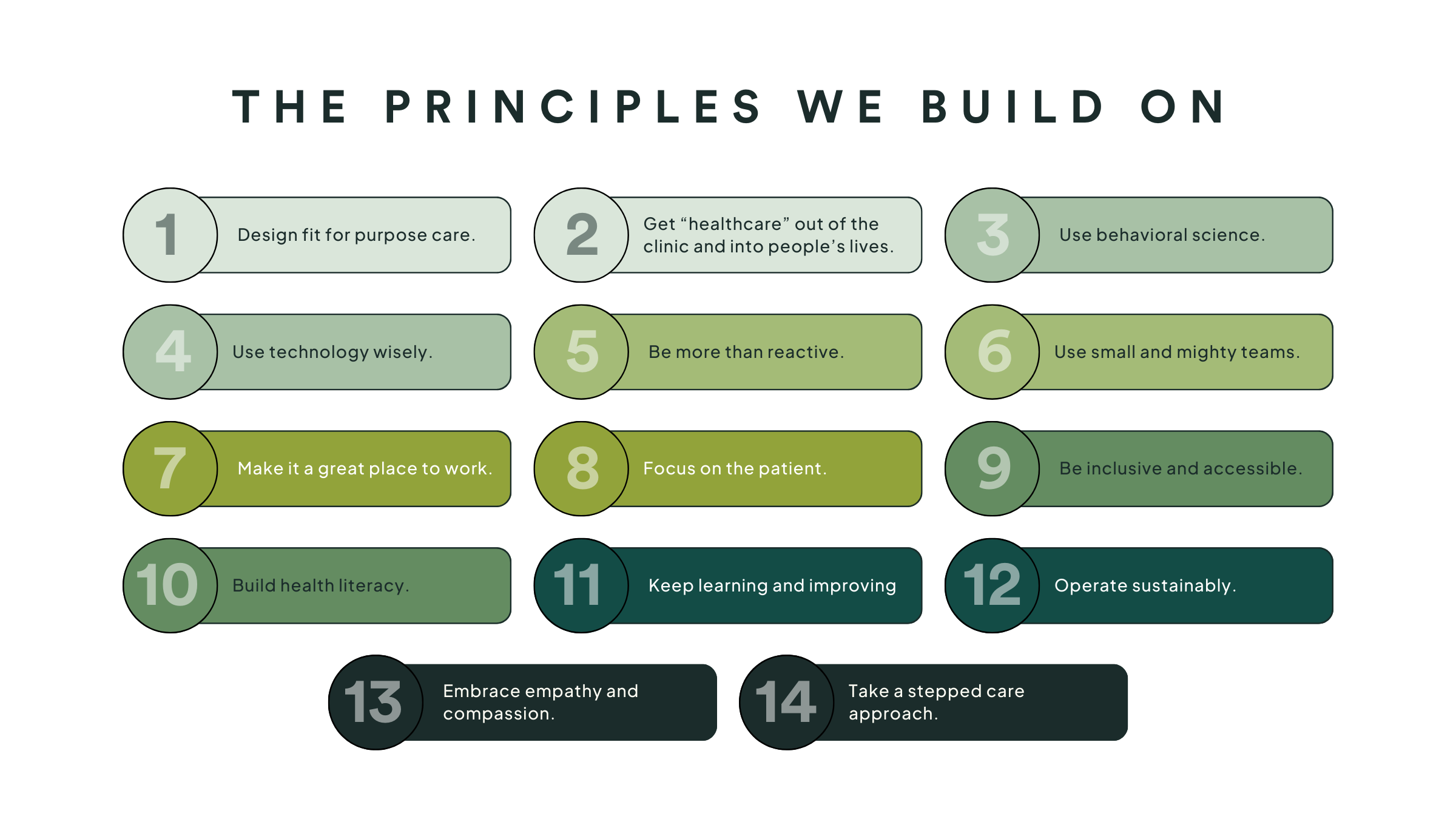Our Secret Mission
We’re growing. Adding new team members, new services, new locations, new systems and new technologies.
But why?
Is it to build our business? Hit quarterly targets? Take over the rehab world?
No. It’s for none of those things. We do what we do because we’re, to our bones, a bunch of health nerds obsessed with doing healthcare right. The way it should be done.
And the healthcare system needs a revolution.
So we’re doing that.
The complexity of this goal humbles us and fires us up at the same time. We gird ourselves with first principles, creativity and a love of experimentation.
These are the principles upon which we build.
1. Design fit for purpose care:
Design health care solutions for narrow-ish use cases. The breadth and complexity of healthcare demands specialized solutions for every sensible category. Typically, a family doctor's day involves dealing with a range of health concerns from infants to end-of-life to chronic disease management to mental health. That’s too much. There’s an important place for generalists, but we observe “generalist sprawl”. Focused healthcare means more expertise and fit for purpose teams and systems.
2. Get “healthcare” out of the clinic and into people’s lives:
An hour or so in the clinic each week is insufficient for most health care projects. Many drivers of health sit outside of conventional healthcare. Think food, relationships, social habits, physical activities, work environments, entertainments, coping strategies, mindsets, community, sense of connection, and purpose. This framing compels us to extend “healthcare” to engage with families, communities, employers and culture.
3. Use behavioral science:
Pills, surgeries, and quick fixes usually don’t address the causes of illness and injury. We need a way to change habits. Enter behavioural sciences. Tall Tree has created a new healthcare role — “change coaches”. These are black belts in behaviour change that don’t just have one-and-done appointments with you, but rather become part of your life for a while. They stay in touch through texts, check-ins, sending you prompts and reminders, and even going to your home or workplace to adjust your environment– one of the most supported interventions for behaviour change.
4. Use technology wisely:
The thoughtful and careful adoption of technology will be key in the evolution of healthcare. Think easily understood and accessible patient-owned medical records and information systems. We’ll need to wisely integrate AI into healthcare to support data handling, administration, and the care itself.
5. Be more than reactive:
Healthcare will evolve beyond reacting to illnesses. Medicine should be personalized, proactive and aimed at optimizing health. It’s not enough to be “not sick”, we see a future where people don’t just live longer, but live healthier.
6. Use small and mighty teams:
Healthcare needs small teams. Teams of 4-6 people – the right size to get diverse expertise and effective communication. The small number of people allows for “shared consciousness” – a prerequisite for highly effective units.
7. Make it a great place to work:
Recruitment, retention, and outcomes rely on a positive culture and work environment. Tall Tree is convinced that an environment and culture that embraces enthusiasm, learning, curiosity, excellence, and a strong sense of purpose leads to outstanding results. Contrast that to the atmosphere of a busy walk-in clinic or ER.
8. Focus on the patient:
Healthcare should be designed with the patient's needs, values, and preferences at the center. Emotional intelligence, listening, communication skills, and cultural sensitivity are essential skills to be fostered. A truly patient-centered approach organizes healthcare to be convenient for patients’ busy schedules and makes it easy to access at times and places that work for them. We know that empowering patients to care better for themselves is central to optimizing health.
9. Be inclusive and accessible:
Healthcare must be accessible to all, regardless of socio-economic status or geographical location.
10. Build health literacy:
We should promote health literacy and use principles from learning psychology to do it. Talking at patients doesn’t work, and a leaflet or brochure to take home does little more. Healthcare needs to educate our patients and our societies and we need to rethink how we do that.
11. Keep learning and improving:
Providers must commit to lifelong learning and be open to new ways of doing things. And organizations too! We need enterprises with the pluck, agility and resourcefulness to adopt change, technology and quality improvements. A culture of constant ongoing improvement. What we don’t need is stagnant bureaucracies.
12. Operate sustainably:
Healthcare should aim for sustainability, minimizing its environmental footprint. We should take an extra step and advocate or invest in green spaces and environmental protection and restoration.
13. Embrace empathy and compassion:
We’re a bunch of health nerds with big hearts. Emphasizing empathy and compassion in patient care improves experiences and outcomes for everyone.
14. Take a stepped care approach:
Healthcare must match the level of intervention with the individual's need, creating a more efficient and effective system. Less is often more. We will provide our patients with the right support and interventions without over-treating them with costly and unnecessary therapies. We will do this by staying up-to-date with the latest scientific evidence and measuring clinical progress to ensure we are hitting the sweet spot for each of our patients.
Tall Tree is a laboratory for these ideas and principles. We experiment and track outcomes to find out what works. We want our model to inspire similar transformations across the country. Through our healthcare education company, AMP Healthcare Education, and by teaching at various universities, we strive to spread our innovative ideas.
We believe that the future of Canadian healthcare lies in the hands of those willing to challenge the status quo, and we're excited to be leading this charge. Together, we can create a healthcare system that serves all of us better. So, join us as we reshape Canadian healthcare — you're going to want to see this!




